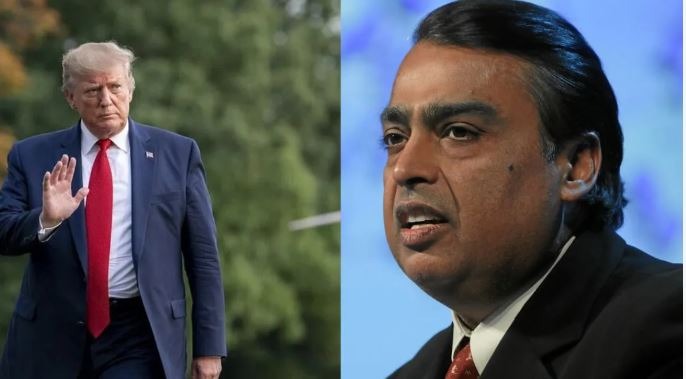Do You Know How the US-India Trade War Is Spotlighting Mukesh Ambani’s Russian Oil Profits
The US-India trade war is reshaping global oil flows and spotlighting Mukesh Ambani’s Reliance Industries for its massive gains from discounted Russian crude. Here’s why it matters in 2025.
BUSINESS & ECONOMY
Do You Know Team
8/11/20254 min read


The year 2025 has brought a seismic shift in global trade relations, particularly between two major economies—the United States and India. What began as a disagreement over tariffs and trade policies has escalated into a full-blown trade war, shaking multiple industries. Among the unexpected beneficiaries of this geopolitical tussle is Mukesh Ambani, India’s richest man and the chairman of Reliance Industries.
At the heart of the story lies Russia’s discounted crude oil exports. As the West imposed sanctions on Moscow, India became one of the largest buyers of cheap Russian crude. Reliance, with its massive refining capacity, took full advantage—turning a crisis into a profit-making opportunity. But now, with the US putting political and economic pressure on India, the spotlight has turned to Ambani’s oil business like never before.
This article breaks down why this situation has unfolded, what it means for India, and how it could shape global energy markets for years to come.
1. The Origins of the US-India Trade War
The tension between the US and India didn’t appear overnight. It started with tariff disagreements, intellectual property disputes, and divergent foreign policy positions. The situation worsened when the US imposed higher tariffs on Indian exports, citing unfair trade practices and India’s growing purchases of Russian oil—a move that directly undermines US-led sanctions.
In retaliation, India introduced its own set of tariffs on US goods, targeting sectors like agriculture, electronics, and energy imports. The result? A diplomatic and economic standoff with ripple effects across industries.
2. Russia’s Discounted Oil: A Game-Changer
After the 2022 Russia-Ukraine conflict, Western sanctions heavily restricted Russian oil sales to Europe and the US. This forced Moscow to sell crude at deep discounts to countries willing to ignore or bypass sanctions.
India seized the opportunity, increasing imports of Russian oil from less than 2% of its total imports in 2021 to over 35% in 2024. The discounts—often $10 to $15 per barrel cheaper than Brent crude—saved India billions of dollars on energy costs.
Reliance Industries, which operates the world’s largest refining complex in Jamnagar, emerged as a primary beneficiary, refining Russian oil into high-value products for both domestic use and export.
3. Mukesh Ambani’s Strategic Advantage
Mukesh Ambani didn’t just rely on luck. Reliance has:
Massive refining capacity (over 1.2 million barrels per day)
Global trading networks to reroute products efficiently
Financial muscle to handle large-volume purchases quickly
By securing long-term contracts with Russian suppliers, Ambani ensured that Reliance could process cheap crude into premium fuels and sell them to countries that aren’t part of the sanctions regime—maximizing profit margins.
4. Why the US Is Targeting India’s Oil Trade
The US argues that India’s purchase of Russian oil indirectly funds Moscow’s war efforts. Additionally, by refining Russian oil and exporting products like diesel, jet fuel, and petrochemicals to other countries, India is essentially helping Russia bypass Western sanctions.
This has prompted Washington to:
Consider secondary sanctions on companies trading Russian oil products
Pressure India diplomatically to reduce imports
Raise tariffs on certain Indian goods in retaliation
Reliance, as the biggest player in this trade, has naturally come under scrutiny.
5. The Economic Ripple Effects for India
While Reliance gains from discounted crude, the US-India trade war creates wider challenges:
Export losses for Indian manufacturers due to US tariffs
Potential banking restrictions if secondary sanctions are applied
Geopolitical balancing act for India, which wants both cheap energy and strong US ties
However, Indian policymakers argue that energy security comes first, and buying cheaper Russian oil helps keep domestic fuel prices stable—a politically important factor.
6. Reliance’s Global Positioning Amid the Turmoil
Ambani has used this geopolitical moment to strengthen Reliance’s position:
Expanding petrochemical capacity to meet rising Asian demand
Investing in renewable energy to future-proof against fossil fuel decline
Leveraging oil profits to finance new ventures in telecom, retail, and green hydrogen
Even if Russian crude imports decline in the future, Reliance’s diversified empire ensures that it remains a dominant force in India’s economy.
7. What This Means for Global Oil Markets
India’s role as a major buyer of Russian oil has reshaped trade flows:
Europe is importing more from the Middle East and the US
Russia is more dependent on Asian markets
US refiners face tougher competition in certain export markets
The longer the US-India trade war lasts, the more these patterns will become entrenched.
8. The Political Undercurrents in 2025
The dispute isn’t just about economics—it’s also about geopolitical influence. The US wants India firmly aligned with its stance on Russia, while India is asserting itself as an independent power that won’t be forced into Western foreign policy positions.
For Ambani, this political tightrope is tricky: Reliance must maintain access to global markets while defending its highly profitable oil business.
Frequently Asked Questions (FAQs)
Q1: Why is the US-India trade war affecting oil trade?
Because India’s purchase and refining of Russian oil challenges US sanctions, making it a central issue in the broader trade dispute.
Q2: Is Reliance Industries violating sanctions?
No. India is not bound by Western sanctions, so Reliance’s trade is legal under Indian law—but it faces political and economic pressure from the US.
Q3: How much has Reliance benefited from Russian oil?
While exact profits are confidential, analysts estimate billions in savings and margins due to discounted crude purchases.
Q4: Could the US impose sanctions on Reliance?
It’s possible if Washington opts for secondary sanctions, though this would risk damaging broader US-India relations.
Q5: Will India stop buying Russian oil?
Unlikely in the short term, as cheap oil is crucial for keeping fuel prices low and supporting economic growth.
Conclusion
The US-India trade war of 2025 is more than just a tariff battle—it’s a test of India’s economic sovereignty, energy security, and geopolitical balancing. Mukesh Ambani’s Reliance Industries sits right in the middle of this storm, profiting immensely from discounted Russian crude while navigating growing scrutiny from the West.
How this unfolds will not only affect India’s economy but also the future of global energy trade. If history is any guide, Ambani will adapt, thrive, and possibly emerge even stronger from the geopolitical turbulence.
#USIndiaTradeWar, #MukeshAmbani, #RelianceIndustries, #RussianOil, #GlobalTrade, #EnergySecurity, #OilMarkets, #Geopolitics, #IndiaEconomy, #USIndiaRelations
Knowledge
Empowering minds with reliable educational content daily.
Newsletter Signup
© 2025 DoYouKnow. All rights reserved.
Stay Ahead of the Trends – Join Our Newsletter
